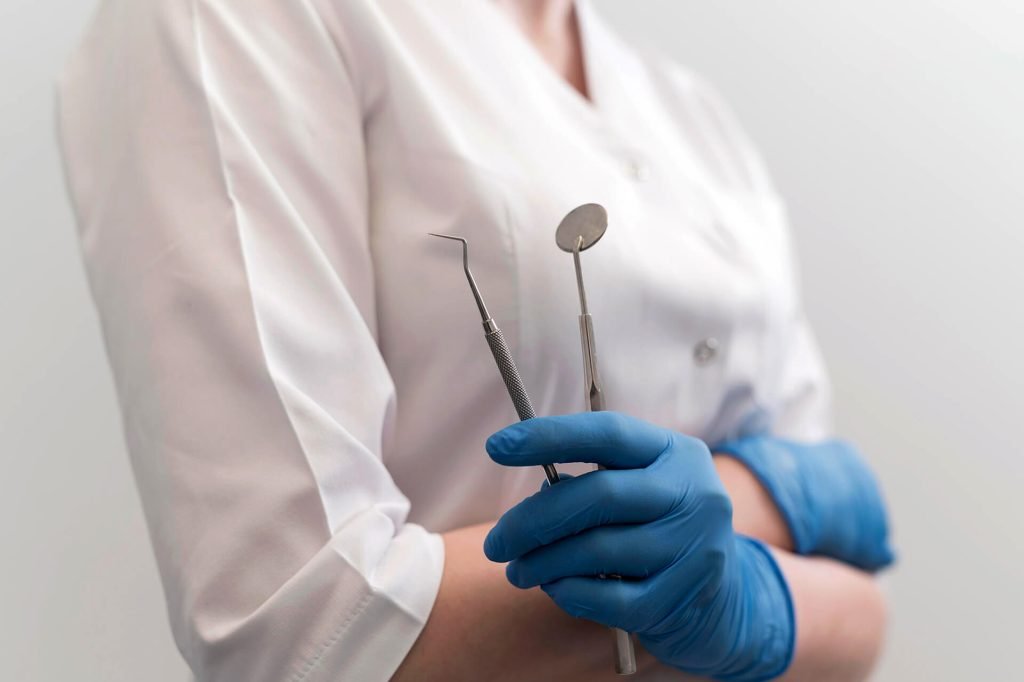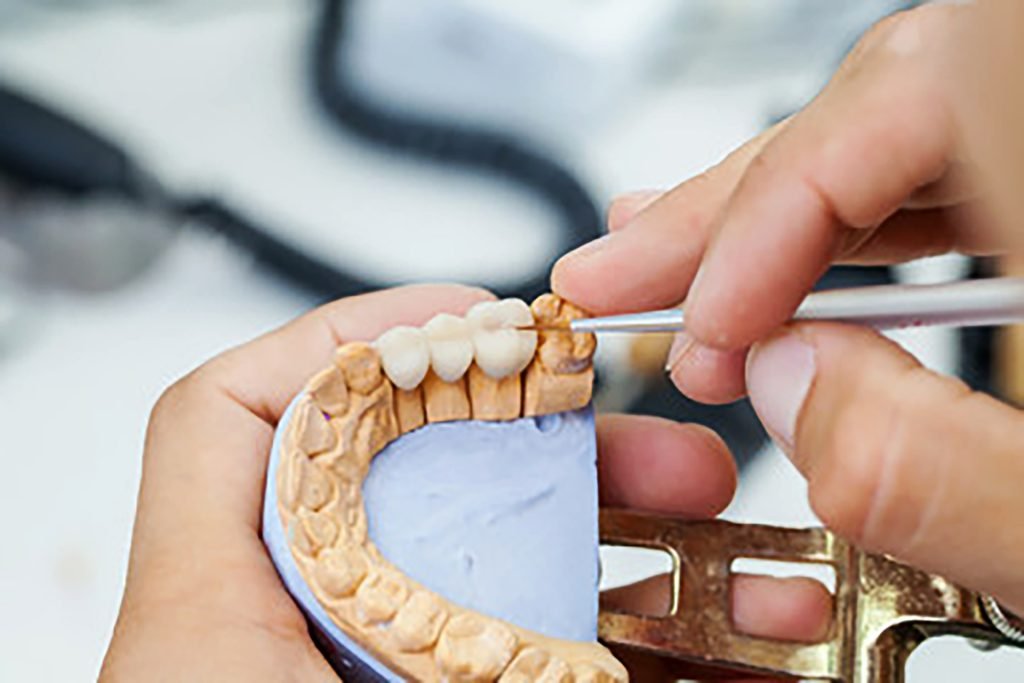Fluoride Treatment

Fluoride treatment is a preventive dental procedure that involves the application of fluoride to the teeth to strengthen enamel, prevent tooth decay, and reduce the risk of cavities. Fluoride is a natural mineral found in water sources, certain foods, and dental products, and it plays a crucial role in maintaining oral health. Here’s how fluoride treatment typically works: Application Fluoride treatment is usually administered as a gel, foam, varnish, or rinse. It can be applied directly to the teeth by a dentist, dental hygienist, or sometimes even self-applied at home under the guidance of a dental professional. Absorption Once applied to the teeth, fluoride is absorbed into the enamel, the outer layer of the tooth. Fluoride strengthens the enamel by remineralizing it, making it more resistant to acid attacks from bacteria and acids in the mouth. Protection Strengthened enamel is less susceptible to decay and cavities. Fluoride also inhibits the growth of bacteria in the mouth, reducing the production of acids that can erode tooth enamel. Fluoride treatment is particularly beneficial for individuals who are at a higher risk of developing cavities, such as: – Children and adolescents: Fluoride helps strengthen developing teeth and protects against cavities during critical stages of tooth development. – Individuals with a history of frequent cavities or poor oral hygiene habits. – People with certain medical conditions or medications that can increase the risk of dental decay. – Those with reduced saliva flow, which can lead to dry mouth and an increased risk of cavities. Fluoride treatment is typically recommended as part of routine dental care, particularly for children and adolescents, and may be performed during regular dental check-ups. The frequency of fluoride treatment may vary depending on individual oral health needs and risk factors. While fluoride treatment is generally safe and effective when used appropriately, excessive fluoride intake can lead to dental fluorosis, a condition characterized by white spots or streaks on the teeth. Therefore, it’s important to follow the recommendations of dental professionals regarding the use of fluoride products and treatments.
Dental Consultation

A dental consultation is an initial appointment with a dentist or dental specialist where you discuss your dental concerns, receive an evaluation of your oral health, and explore potential treatment options. Dental consultations are crucial for establishing a relationship with your dental provider, understanding your oral health needs, and developing a personalized treatment plan. During a dental consultation, several key components typically occur: Discussion of Dental Concerns You’ll have the opportunity to express any dental issues or concerns you may have, such as tooth pain, gum bleeding, cosmetic desires, or questions about oral hygiene. Medical and Dental History Review The dentist will review your medical and dental history, including any medications you are currently taking, past dental treatments, and any relevant medical conditions. Clinical Examination The dentist will conduct a thorough examination of your mouth, teeth, gums, jaw, and oral tissues. They’ll check for signs of decay, gum disease, oral cancer, bite alignment issues, and other dental problems. Diagnostic Tests Depending on your specific needs, the dentist may take dental X-rays, intraoral photographs, or impressions to gather more information about your oral health and aid in diagnosis. Treatment Recommendations Based on the findings from the examination and diagnostic tests, the dentist will discuss potential treatment options to address your dental concerns. This may include preventive care, restorative treatments, cosmetic procedures, or referrals to specialists for more complex issues. Cost and Insurance Coverage The dentist or their staff will provide information about the cost of recommended treatments, payment options, and any insurance coverage you may have. Patient Education You’ll receive guidance on maintaining good oral hygiene practices, preventing dental problems, and understanding the importance of regular dental check-ups. Addressing Questions and Concerns You’ll have the opportunity to ask questions, seek clarification, and voice any concerns you may have about your dental health or proposed treatment plan. By the end of the dental consultation, you should have a clear understanding of your oral health status, any existing dental issues, recommended treatments, associated costs, and the next steps in your dental care journey. It’s essential to be actively engaged during the consultation, communicate openly with your dental provider, and feel comfortable asking questions to ensure you make informed decisions about your oral health.
Why Zirconia Crowns are Highly Recommended?

One of the challenges in dental restoration is to restore the functionality of teeth, which is essentially to grind and chew food for proper digestion. Over the years so many materials were discovered, tested and applied not just to regain the teeth grinding and chewing ability but also for easthetic purposes. Several materials with metal properties such as titanium, gold along with ceramics, porcelain and the likes have brought innovation in the field of dentistry. But up until recent years Zirconia crowns have gained popularity because of its notable aesthetic factor that mimics the look of natural teeth due to its translucent property. Zirconia materials has proven to have possessed a certain level of durability and strenght, albeit it was started being adopted and utilized as dental crowns since sometime in the late 90s. It exhibits superiority over its porcelain counterparts mainly because of the comfort it offers that is brought about by its being non-abrasive nature. What is Zirconia? Zirconia (zirconium dioxide) is a white, powdered metal oxide. It is made from zirconium, a metal with similar properties to titanium and is mined around the world. It is found in dinnerware and electrical fixtures, among other products. Zirconium makes an ideal choice for dental material, especially dental crowns, because it is chemically unreactive, and its toughness fitted most in posterior area where higher strenght is required to masticate food. Zirconia’s inherent white color and high hardness, high fracture toughness (difficult to crack) properties make an ideal choice for dental crown materials. Some of its beneficial qualities are resistance to wear, resistance to oxidation, no chemical corrosion and its translucent appearance when sintered (baked). What are the benefits of Zirconia crowns? Strength Zirconia crowns have an extremely high flexural and tensile strength. Upon being subjected through rigorous laboratory testing, zirconia crowns yeild a higher percentage of bending strength than porcelain. It has an innate capacity to better withstand the normal wear and tear on teeth from grinding and chewing. Thus, restoring the functionality of teeth closest to the original state. Durability Because of its natural strength and durability, Zirconia crowns generally last longer than its counterparts. Its being non-porous in nature makes Zirconia crowns more resistant to chipping, cracking and staining. Cosmetics The natural white color of zirconium material and its translucent microstructure properties have the ability to match the shade of the original teeth, and are optimized by technology and executed by highly skilled technicians in fabrication process. The final product exhibits an elegant, custom-crafted Zirconia crowns, engineered to seamlessly integrate into your smile. Comfort Due to the non-abrasive nature of the material, Zirconia crowns offer a superior level of comfort. The product has a smooth exterior surface, which prevents abrasion to surrounding teeth and gum tissue. Abrasive materials produce frictions in the course of its function that may cause damage to the surrounding teeth and soft tissues. To find out if Zirconia crowns are the best choice for you? You may call/text (02) 921-1729, 0918-4008899, 0917-9685003 or click this link (Book An Appointment) to book an appointment and avail your complementary consult.

